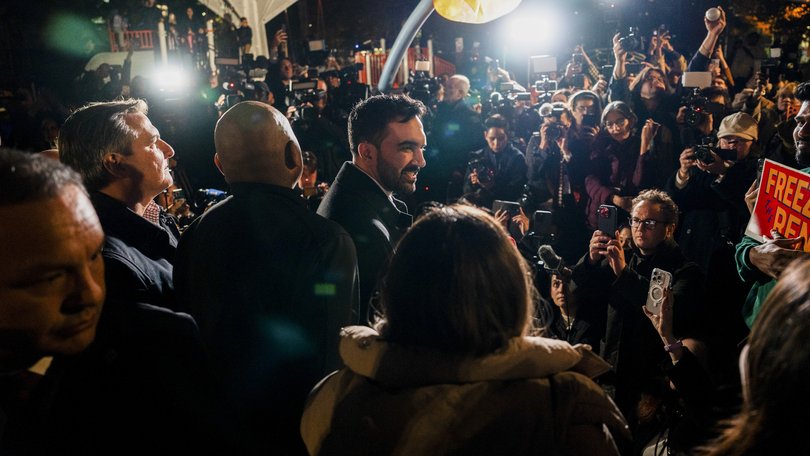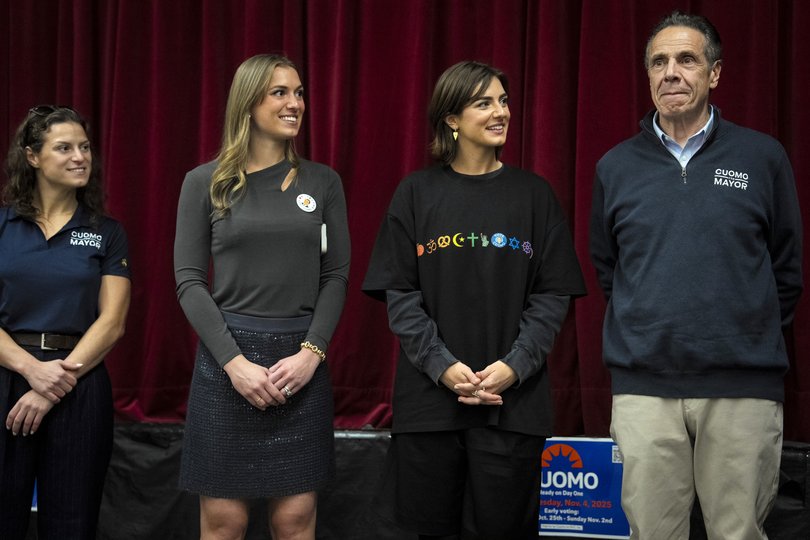THE NEW YORK TIMES: Zohran Mamdani is elected New York Mayor, capping his ascent
THE NEW YORK TIMES: Zohran Mamdani, a once unheralded state lawmaker from Queens whose affordability platform and charisma fuelled a meteoric political rise, has become the 111th mayor of New York.

Zohran Mamdani, a once unheralded state lawmaker from Queens whose affordability platform and charisma fuelled a meteoric political rise, was elected on Tuesday as the 111th mayor of New York, according to The Associated Press.
The victory by Mr Mamdani, 34, a democratic socialist, placed a final stamp on the astonishing ascent of an Assembly member who rose from anonymity to defeat better-known rivals including former Governor Andrew Cuomo, first in the Democratic primary and now again in the general election.
His win represents a major triumph for progressives, empowering a new coalition of younger voters and immigrants who volunteered for his campaign, filled its coffers with thousands of small donations and flocked to the polls to elect the city’s first Muslim mayor.
Sign up to The Nightly's newsletters.
Get the first look at the digital newspaper, curated daily stories and breaking headlines delivered to your inbox.
By continuing you agree to our Terms and Privacy Policy.When Mamdani takes office on Jan. 1, he will become the most powerful Muslim elected official in the United States — a breakthrough for many Muslim Americans who feel pride in his success and anxiety over the Islamophobia his campaign has stirred, nearly a quarter-century after the 9/11 attacks.
Mr Mamdani, who was born in Uganda to parents of Indian descent and moved to New York City as a boy, will also be the first South Asian mayor, the city’s youngest mayor in more than a century, its second democratic socialist mayor and first millennial mayor.
He could face significant challenges bringing the city together after a bitter campaign. He must navigate hostility from President Donald Trump, who has repeatedly attacked him, as he works to deliver on his ambitious affordability-minded campaign promises.
Mr Mamdani ran on simple pledges to make buses free, to freeze the rent on rent-stabilized apartments and to provide universal free child care.
The results in New York came as Democrats across the country sought to make gains to combat Trump’s agenda.
In the Virginia governor’s race, Abigail Spanberger, a moderate Democrat who served three terms in Congress, defeated Lt. Gov. Winsome Earle-Sears, a socially conservative Republican.
In the New Jersey governor’s race, Representative Mikie Sherrill, a Democrat, prevailed over Jack Ciattarelli, a Republican. And in California, voters approved a ballot measure that would allow the redrawing of congressional districts to create more Democratic seats and help offset Republican-led redistricting efforts in Texas and elsewhere.
Mr Mamdani defeated Mr Cuomo, 67, who ran as an independent after losing the Democratic primary, and Curtis Sliwa, 71, the Republican best known as the founder of the Guardian Angels anti-crime organization. For months, Mr Cuomo mercilessly attacked Mr Mamdani as too inexperienced and too far to the left.

But Mr Mamdani built a formidable coalition from non-traditional sources, winning support from young professionals, immigrants and Muslims — some of them likely to have been among the 107,000 first-time voters who registered in New York City since the primary.
Mr Mamdani harnessed the power of social media to connect with voters, and his supporters were drawn to his upbeat message and his energetic way of delivering it.
“It feels like hope,” said Michelle McSweeney, 44 who cast her ballot for Mr Mamdani at a library in Bay Ridge, Brooklyn, and brought along her two children. “I don’t think I’ve felt like this since Barack Obama.”
More than 2 million people voted, a level of turnout for a mayoral election not seen since 1969, according to the city’s Board of Elections.
It was not clear late Tuesday night whether Mr Mamdani would surpass 50 per cent of the total vote — an achievement that could help him argue that he has a mandate to enact his agenda. A decisive margin could buttress the argument from Mamdani and progressive Democratic leaders that their party should more fully embrace their message.
But many national Democrats, especially those in swing districts, fear that Mr Mamdani’s name and brand will be toxic with the type of centrist voters who may decide toss-up congressional midterm contests, and will be used by Republicans as a campaign weapon. Republicans have assailed Mr Mamdani’s plans to raise taxes on the rich and his criticism of Israel.
Mr Trump has frequently insulted Mr Mamdani and gave a last-minute endorsement to Mr Cuomo on Monday, writing on Truth Social, “You must vote for him, and hope he does a fantastic job. He is capable of it, Mamdani is not!”
Mr Trump repeated his vow to withhold federal funds if Mr Mamdani were elected, saying it was “highly unlikely that I will be contributing Federal Funds, other than the very minimum as required.”

How Mr Mamdani grapples with the President will be among his greatest and most immediate challenges. Some fear that Mr Trump will send the National Guard or a surge of immigration enforcement officials into the city after Mr Mamdani takes office.
Other challenges await. Only five years ago, Mr Mamdani was a firebrand Assembly newcomer who embraced the “defund the police” movement at the height of national protests against police brutality. Now he will manage a $US115 billion city budget and a workforce of 300,000, including more than 34,000 police officers.
He may also need to smooth over differences with some of the well-heeled critics who fought his candidacy, donating millions of dollars to super PACs to try to defeat him. Michael Bloomberg, the billionaire former mayor, spent more than $US9 million to assist Mr Cuomo, including a $US1.5 million infusion late in the race.
That opposition may be a factor as Mr Mamdani seeks to build an administration that is aligned with his democratic socialist vision, but also filled with enough respected government veterans to appease sceptics.
Mr Mamdani has pledged to run a more ethical administration than his predecessor, Mayor Eric Adams, who was the first sitting mayor in the modern history of New York City to be indicted. The federal corruption charges were later dropped by the Trump administration. Cr Adams, who had skipped the Democratic primary to run for re-election as an independent, ended his campaign in September and endorsed Mr Cuomo.
Mr Mamdani was embraced by prominent leaders on the left, including Senator Bernie Sanders of Vermont and Representative Alexandria Ocasio-Cortez of New York.
Some Democrats refused to endorse him, and many Jewish leaders expressed deep concerns over his criticism of Israel and his vow to arrest Prime Minister Benjamin Netanyahu if he visits New York. Senator Chuck Schumer of New York, the Democratic leader, did not make an endorsement in the race, and on Tuesday would not reveal whom he voted for.
But Mr Mamdani found allies in Letitia James, the state attorney general, and Governor Kathy Hochul, who endorsed Mr Mamdani in September and appears eager to work with him on issues like universal child care next year as she runs for re-election.
By the tail end of the campaign, Mr Mamdani’s momentum with voters and Democratic leaders was obvious. Representative Hakeem Jeffries, the House minority leader, gave his endorsement on October 24. A day later, Mr Mamdani drew nearly 13,000 people to Forest Hills Stadium in Queens for the kind of rally more commonly seen on the presidential campaign trail.
Mohammed Khaleque, 56, a Muslim voter who is Bangladeshi and who runs a small paralegal service, voted for Mamdani in the Parkchester neighbourhood in the Bronx.
“There is a little pride that he is the first Muslim mayor, but he’s the mayor that can help all working people in New York City,” he said. “He talks about everyone.”
For Mr Cuomo, the stinging loss, after once being considered the front-runner in the race, could spell the end of a long career in public service and the end of a New York political dynasty.
His father, Mario Cuomo, also lost his mayoral campaign, but soon became a national Democratic icon as a three-term governor.
Such a recovery seems improbable for Andrew Cuomo, who resigned in disgrace from the governor’s office in 2021 amid a flurry of sexual harassment accusations, which Mr Mamdani and Mr Sliwa repeatedly brought up in their debates.
Although Mr Mamdani sought to temper his past criticisms of the police, Mr Cuomo used them to paint his opponent as unfit to fight the city’s crime.
Some of Mr Cuomo’s voters cited worries about crime in explaining why they chose him, but mostly, his support came from people who were unsettled by Mr Mamdani and saw no better alternative.
This article originally appeared in The New York Times.
© 2025 The New York Times Company
Originally published on The New York Times
